|
Books Should Be Free Loyal Books Free Public Domain Audiobooks & eBook Downloads |
|
|
Books Should Be Free Loyal Books Free Public Domain Audiobooks & eBook Downloads |
|
Books on Languages |
|---|
Book type:
Sort by:
View by:
|
By: Leo Tolstoy (1828-1910) | |
|---|---|
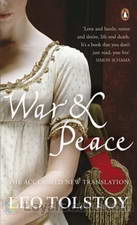 War and Peace
War and Peace
Leo Tolstoy's War and Peace chronicles the lives of five Russian aristocratic families during Napoleon's invasion of Russia. Many considered this book to be the best Russian work of literature of all time and it is massive in scale. The book is divided in four volumes and the chapters don't just contain the narrative of the plot to the novel but philosophical discussions as well. This may be intimidating to average book readers but they shouldn't be discouraged to try reading War and Peace. After all, this book was written for all and not just for intellectuals... | |
 Childhood (English trans.)
Childhood (English trans.)
Childhood, published in 1852, is the first novel in Leo Tolstoy’s autobiographical trilogy, which also includes Boyhood, and Youth. Published when Tolstoy was twenty-three, the book gained immediate notice among Russian writers including Ivan Turgenev, and heralded the young Tolstoy as a major figure in Russian letters. Childhood is an expressionist exploration of the internal life of a young boy, Nikolenka, and was a new form in Russian writing, mixing fact, fiction and emotions to render the moods and reactions of the narrator. Childhood is Tolstoy’s first published work. Translated into English by C. J. Hogarth. | |
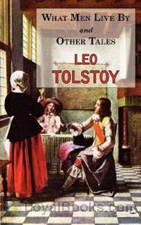 What Men Live By and Other Tales
What Men Live By and Other Tales
Although Leo Tolstoy (1828-1910) was a wealthy landowner, in his later life he had what was considered a “religious awakening.” This experience went on to inform his writing and his lifestyle in profound ways. His views transcended the specifics of religion, as known in his day – so much so he came to be a helpful guide both to Mohandas Gandhi and to Dr. Martin Luther King Jr. The four stories in this collection ask profound questions and gently supply helpful, non-dogmatic hints to their... | |
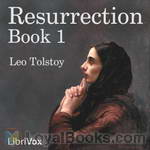 Resurrection
Resurrection
Book 1. Resurrection is the last of Tolstoy's major fiction works published in his lifetime. Tolstoy intended the novel as an exposition of injustice of man-made laws and the hypocrisy of institutionalized church. It was first published serially in the magazine Niva as an effort to raise funds for the resettlement of the Dukhobors. The story concerns a nobleman named Nekhlyudov, who seeks redemption for a sin committed years earlier. His brief affair with a maid resulted in her being fired and ending up in prostitution. The book treats his attempts to help her out of her current misery, but also focuses on his personal mental and moral struggle. | |
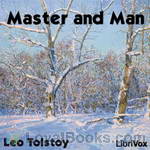 Master and Man
Master and Man
A land owner, Vasili Andreevich, takes along one of his peasants, Nikita, for a short journey to another town. He wishes to get to the town quickly ‘for business’. They find themselves in the middle of a blizzard, but the master in his avarice wishes to press on. They eventually get lost off the road and they try to camp. The master’s peasant soon finds himself about to die from hypothermia. The master leaves him on the horse to stubbornly try to find the road. When he returns, he attains a spiritual/moral revelation, and Tolstoy once again repeats one of his famous themes: that the only true happiness in life is found by living for others. (Wikipedia) | |
 The Cossacks
The Cossacks
The Cossacks (1863) is an unfinished novel which describes the Cossack life and people through a story of Dmitri Olenin, a Russian aristocrat in love with a Cossack girl. This text was acclaimed by Ivan Bunin as one of the finest in the language. | |
 Ivan the Fool
Ivan the Fool
Written after Tolstoy suffered a spiritual crisis, Ivan the Fool is a fairy tale that offers children instruction in how to live rightly, simply, and generously. The story emphasizes the destructive aspects of materialism and militarism while idealizing manual labor and the peasant life. (Introduction by Dorlene Kaplan) | |
 Youth
Youth
Youth is the third in Tolstoy's trilogy of three autobiographical novels, including Childhood and Boyhood, published in a literary journal during the 1850s. (Introduction by Bill Boerst) | |
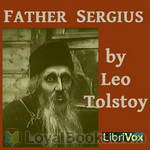 Father Sergius
Father Sergius
Prince Stepan Kasatsky experiences a disappointment with his fiancé and decides to become a monk! There is a story line, but beneath it, Father Sergius struggles to find peace and, if not happiness, then at least contentment. But he is always disillusioned and ultimately unsatisfied. Only in the end does he find his way by letting go of what he struggled to attain all his life, i.e. to be better than everyone else in whatever he did, and settle for the mundane. | |
 The Awakening (The Resurrection)
The Awakening (The Resurrection)
| |
 The Forged Coupon
The Forged Coupon
| |
 The Power of Darkness
The Power of Darkness
| |
 On the Significance of Science and Art
On the Significance of Science and Art
| |
 The Light Shines in Darkness
The Light Shines in Darkness
| |
 Fruits of Culture
Fruits of Culture
| |
 The Cause of it All
The Cause of it All
| |
 The Live Corpse
The Live Corpse
| |
 Plays Complete Edition, Including the Posthumous Plays
Plays Complete Edition, Including the Posthumous Plays
| |
 The First Distiller
The First Distiller
| |
By: Aesop (620 BC - 563 BC) | |
|---|---|
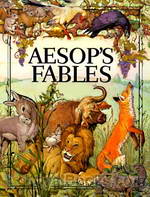 Aesop's Fables
Aesop's Fables
As children, our first experience of the magic of talking animals, the conflict between good and evil, the battle of wits between the cunning and the innocent most probably came from Aesop's Fables. These delightful, pithy and brief narratives are simple, easy to understand and convey their message in a memorable and charming fashion. Aesop's Fables by Aesop consists of about 600 tales, some well-loved and familiar, others less known but just as entertaining and educative and help us map the perimeters of our moral universe... | |
By: Homer | |
|---|---|
 The Odyssey
The Odyssey
A wandering king who's a war-hero doomed to roam the earth by a vengeful God, a plethora of fantastic experiences, a wife battling the invasion of suitors who wish to replace her missing husband, a son in search of his father - the Odyssey is a rich tapestry of incredible experiences and unforgettable characters. A must-read classic for anyone who wants to understand the fundamentals of Western mythology, it is a sequel to the Illiad which recounts the magnificent saga of the Trojan War. The Odyssey continues on, describing the trials and tribulations of the Greeks under the leadership of Odysseus... | |
By: Fyodor Dostoyevsky (1821-1881) | |
|---|---|
 Crime and Punishment
Crime and Punishment
A mysterious crime is being plotted in a tiny garret above a dilapidated apartment building in St Petersburg in Russia. The plotter, Rodion Raskolinikov, is a poor student who has delusions of ridding the world of “worthless vermin” and counter balancing these crimes with good deeds. He commits a murder to test his own theories and prove that crime comes naturally to the human species. Crime and Punishment is a path-breaking novel of ideas that changed the course of novel writing in the 20th century... | |
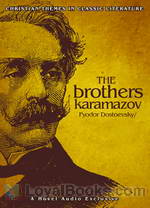 The Brothers Karamazov
The Brothers Karamazov
Set in 19th century Russia, The Brothers Karamazov (Russian: Братья Карамазовы) is the last novel written by the illustrious author Fyodor Dostoyevsky who died a few months before the book's publication. The deeply philosophical and passionate novel tells the story of Fyodor Karamazov, an immoral debauch whose sole aim in life is the acquisition of wealth. Twice married, he has three sons whose welfare and upbringing, he cares nothing about. At the beginning of the story, Dimitri Karamazov, the eldest son who is now a twenty-eight year old war veteran, returns to his home town to claim the inheritance left to him by his dead mother... | |
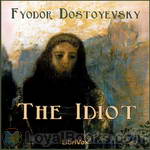 The Idiot
The Idiot
The extraordinary child-adult Prince Myshkin, confined for several years in a Swiss sanatorium suffering from severe epilepsy, returns to Russia to claim his inheritance and to find a place in healthy human society.The teeming St Petersburg community he enters is far from receptive to an innocent like himself, despite some early successes and relentless pursuit by grotesque fortune-hunters. His naive gaucheries give rise to extreme reactions among his new acquaintance, ranging from anguished protectiveness to mockery and contempt... | |
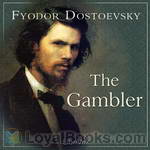 The Gambler
The Gambler
The Gambler is a short novel by Fyodor Dostoevsky about a young tutor in the employment of a formerly wealthy Russian general. The novella reflects Dostoevsky's own addiction to roulette, which was in more ways than one the inspiration for the book: Dostoevsky completed the novella under a strict deadline so he could pay off gambling debts. | |
 Possessed
Possessed
| |
 The Grand Inquisitor
The Grand Inquisitor
| |
By: Edgar Wallace (1875-1932) | |
|---|---|
 Tam o' the Scoots
Tam o' the Scoots
| |
By: Aristotle (384 BCE-322 BCE) | |
|---|---|
 Rhetoric
Rhetoric
The Rhetoric was developed by Aristotle during two periods when he was in Athens, the first between 367 to 347 BCE (when he was seconded to Plato in the Academy), and the second between 335 to 322 BCE (when he was running his own school, the Lyceum). The Rhetoric consists of three books. Book I offers a general overview, presenting the purposes of rhetoric and a working definition; it also offers a detailed discussion of the major contexts and types of rhetoric. Book II discusses in detail the three means of persuasion that an orator must rely on: those grounded in credibility (ethos), in the emotions and psychology of the audience (pathos), and in patterns of reasoning (logos)... | |
 On Interpretation
On Interpretation
Aristotle's On Interpretation (Greek Peri Hermeneias) or De Interpretatione (the Latin title) is the second of Aristotle's six texts on logic which are collectively known as the Organon. On Interpretation is one of the earliest surviving philosophical works in the Western tradition to deal with the relationship between language and logic in a comprehensive, explicit, and formal way. The work begins by analyzing simple categoric propositions, and draws a series of basic conclusions on the routine... | |
By: Anicius Manlius Severinus Boethius (480-525?) | |
|---|---|
 The Theological Tractates and The Consolation of Philosophy
The Theological Tractates and The Consolation of Philosophy
| |
By: Plato (427BC - 347BC) | |
|---|---|
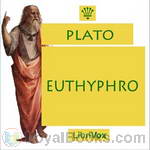 Euthyphro
Euthyphro
Awaiting his trial on charges of impiety and heresy, Socrates encounters Euthyphro, a self-proclaimed authority on matters of piety and the will of the gods. Socrates, desiring instruction in these matters, converses with Euthyphro, but as usual, the man who professes to know nothing fares better than the man who claims to be an expert. One of Plato’s well-known Socratic Dialogues, Euthyphro probes the nature of piety, and notably poses the so-called Euthyphro Dilemma: Do the gods love a thing because it is holy, or is a thing holy because it is loved by the gods? | |